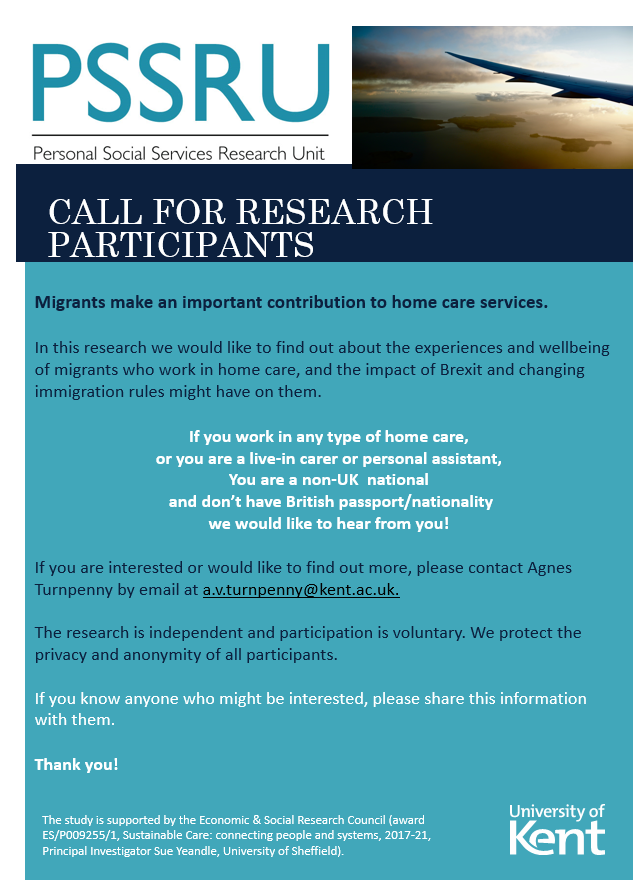 Migrant labour in the UK home care sector: a sustainable wellbeing analysis
Migrant labour in the UK home care sector: a sustainable wellbeing analysis
Principal investigator: Shereen Hussein
Team: Shereen Hussein, Agnes Turnpenny, Sab Siddiq (KCL)
Start year: 2017
End year: 2021
Funder: Economic and Social Research Council (award ES/P009255/1)
UK Partners: University of Sheffield, King’s College London, University of Birmingham, Carers UK
_________________________________________________________
Description:
Home care workers provide personal care and practical/emotional support. They include women who enjoy this work but may lack other job options, including migrants, and people with multiple caring roles. Marketisation, personalisation and austerity have created new labour market dynamics and a growing ‘grey’ care economy. Much care is provided by for-profit organisations, some having absorbed pressures by cutting wages, rights and protection, exacerbating recruitment difficulties.
The UK care sector has long relied on immigration to fill labour shortages. The EU’s Eastward enlargement in 2004 and tighter regulation of non-EU migration changed the profile of migrant care workers. Although their prevalence in social care remains stable (around 20%; in London 50%), but by mid-2013 those from Bulgaria and Romania exceeded all those arriving from outside the EU.
Brexit and possible reductions in care labour from EU/other markets pose pressing questions about the sector’s capacity to meet demand. Other possible reforms (an ‘extended points-based/skills-based migration system’) may also affect international recruitment, as wages in care work, seen as ‘unskilled’, are below likely thresholds. This study investigates the following questions:
- How are UK migration policy changes affecting the roles, recruitment and status of migrant home care workers? Which groups are most affected, and why? Are there differences across the four UK nations?
- What are the implications of these changes for sustainability and wellbeing for care users, carers, home care providers/businesses, migrant and non-migrant care workers, and care commissioners?
- In light of these developments, what changes are required in the support and organisation of home care? (PO4)
- In shaping future home care policy and practice, what can be learned from other countries where migrant care labour features significantly in how home care is delivered?
Methods/Analysis:
We use a range of comparative and exploratory methods necessary for understanding how sustainability and wellbeing can be achieved in care arrangements. We carry out comparative analyses of statistical, policy and case study data, and systematic international policy and evidence reviews, focused on how policies are developed, implemented and revised.
We also conduct interviews with migrant home care workers, agencies and home care providers, service users and family carers, and other stakeholders (e.g. regulators etc.).
Publications:
Main programme website – hosted by the University of Sheffield
Blog – Reflections on the Proposed UK Skills-Based Immigration System and the Social Care Sector
Transforming Care conference presentation
British Society of Gerontology conference presentation
Report – Summary of Round 1 of a Delphi Survey: Estimating demand and supply of migrant home care workers in the UK
Information for research participants – you can download here information about what taking part in the study involves and our privacy and complaints policies.
Information for care users and family carers
Information for providers and agencies
Consent form – everybody who agrees to take part in the research will be asked to complete a consent form. This is available here.